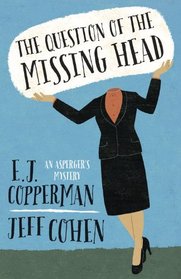Helpful Score: 3
I really didn't know what to expect with a story like the one in this book. The author described it very succinctly at an event I attend and I thought 'it seems interesting'. Wow - I read it in one day - had trouble putting it down. I was drawn in from the first page. Samuel is a most endearing main character and Ms. Washburn a great supporting cast member. The story kept me guessing (a murder mystery but really about a missing head) and the dialog was quick and witty. If you know someone with Asperger's Syndrome, you will find this story very heart-warming. I really hope this is a series!
Helpful Score: 2
The Question of the Missing Head is a story that I enjoyed from first page to last. Its convoluted (but not confusing) mystery was so much fun to follow, and it had a lot to do with the characters that Jeff Cohen has created.
Samuel is marvelous-- at times exasperating, brilliant, startling, and downright funny. What I didn't find all that unusual is that I identified with him in a few things like ringing telephones and surprises. He owes a lot to the love and parenting of his mother, who has one of the best lines in the book. Cohen not only shows Samuel's strengths, he shows his weaknesses as well-- and I'm with Samuel on sudden, earsplitting noises that won't stop (although I don't react in quite the same way).
Samuel is also very careful to clear up any confusion with television's Adrian Monk, which might help a few readers. His passions are baseball and the Beatles, and I love his theory that he can tell a lot about a person by discovering their favorite Beatles song. I even wonder what Samuel would tell me if I said "In My Life"?
Out-of-work photographer Janet Washburn is the perfect associate for Samuel. She doesn't overreact to any of Samuel's peculiarities, and the conversations she's able to have with him about subjects like his mother and the investigation into the death at the Institute are both illuminating and touching. These talks tell readers a lot about both characters.
I was momentarily alarmed when Detective Lapides arrived on the scene because I thought the book was going to be saddled with the resident too-stupid-to-live cop. I should have known better. In Lapides Cohen has created a police officer who might not be the sharpest knife in the drawer, but he knows his limitations. Lapides wants to do a good job, and he's willing to follow Samuel's good advice which many other detectives wouldn't have the sense to do.
And because Samuel's priorities are different from most people's, he doesn't get upset at one point when the investigation starts to bog down. What's more important than the investigation? You're just going to have to read the book to find out. This first Asperger's mystery got me hook, line, and sinker, and I look forward to Samuel's next investigation... err... question.
Samuel is marvelous-- at times exasperating, brilliant, startling, and downright funny. What I didn't find all that unusual is that I identified with him in a few things like ringing telephones and surprises. He owes a lot to the love and parenting of his mother, who has one of the best lines in the book. Cohen not only shows Samuel's strengths, he shows his weaknesses as well-- and I'm with Samuel on sudden, earsplitting noises that won't stop (although I don't react in quite the same way).
Samuel is also very careful to clear up any confusion with television's Adrian Monk, which might help a few readers. His passions are baseball and the Beatles, and I love his theory that he can tell a lot about a person by discovering their favorite Beatles song. I even wonder what Samuel would tell me if I said "In My Life"?
Out-of-work photographer Janet Washburn is the perfect associate for Samuel. She doesn't overreact to any of Samuel's peculiarities, and the conversations she's able to have with him about subjects like his mother and the investigation into the death at the Institute are both illuminating and touching. These talks tell readers a lot about both characters.
I was momentarily alarmed when Detective Lapides arrived on the scene because I thought the book was going to be saddled with the resident too-stupid-to-live cop. I should have known better. In Lapides Cohen has created a police officer who might not be the sharpest knife in the drawer, but he knows his limitations. Lapides wants to do a good job, and he's willing to follow Samuel's good advice which many other detectives wouldn't have the sense to do.
And because Samuel's priorities are different from most people's, he doesn't get upset at one point when the investigation starts to bog down. What's more important than the investigation? You're just going to have to read the book to find out. This first Asperger's mystery got me hook, line, and sinker, and I look forward to Samuel's next investigation... err... question.




